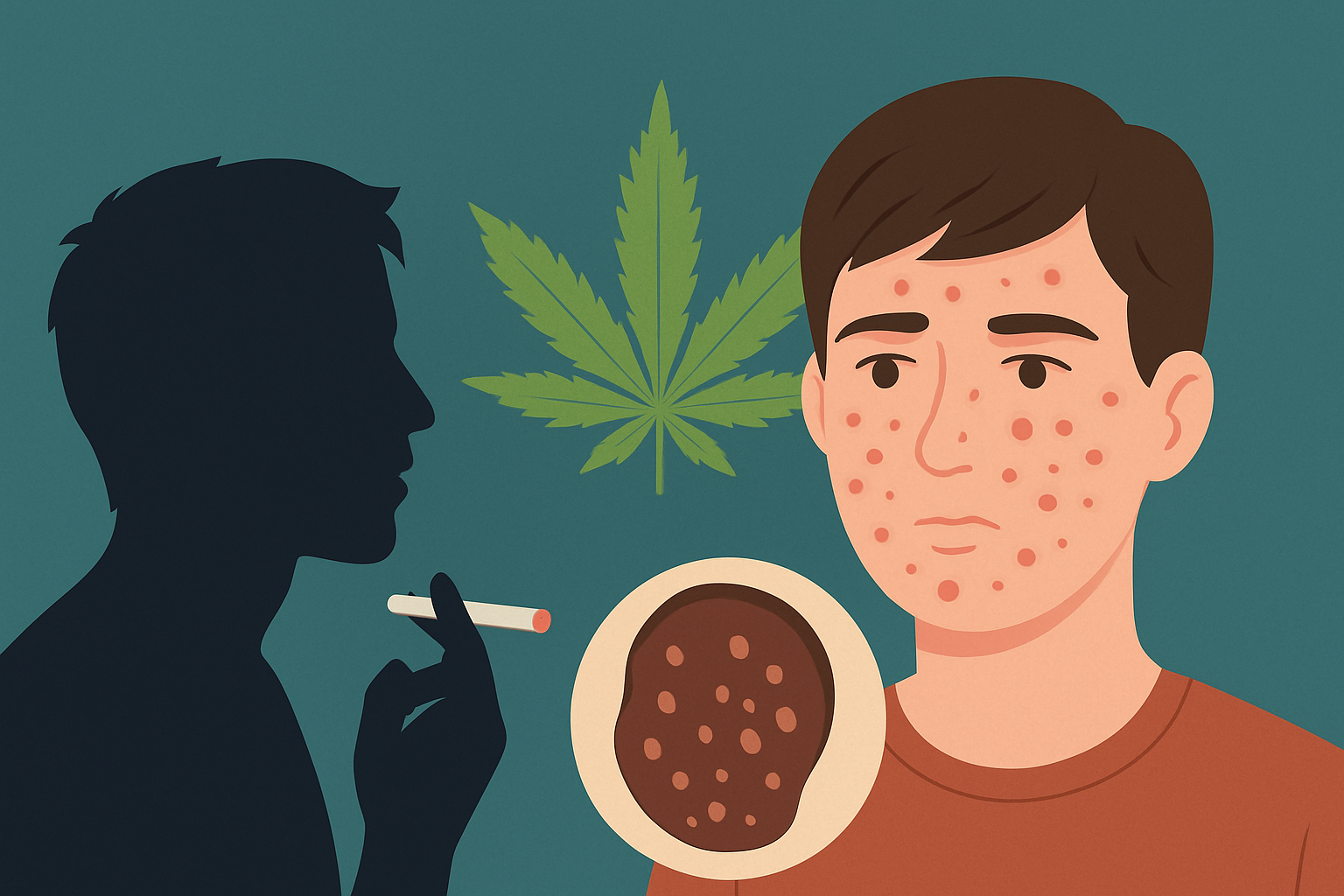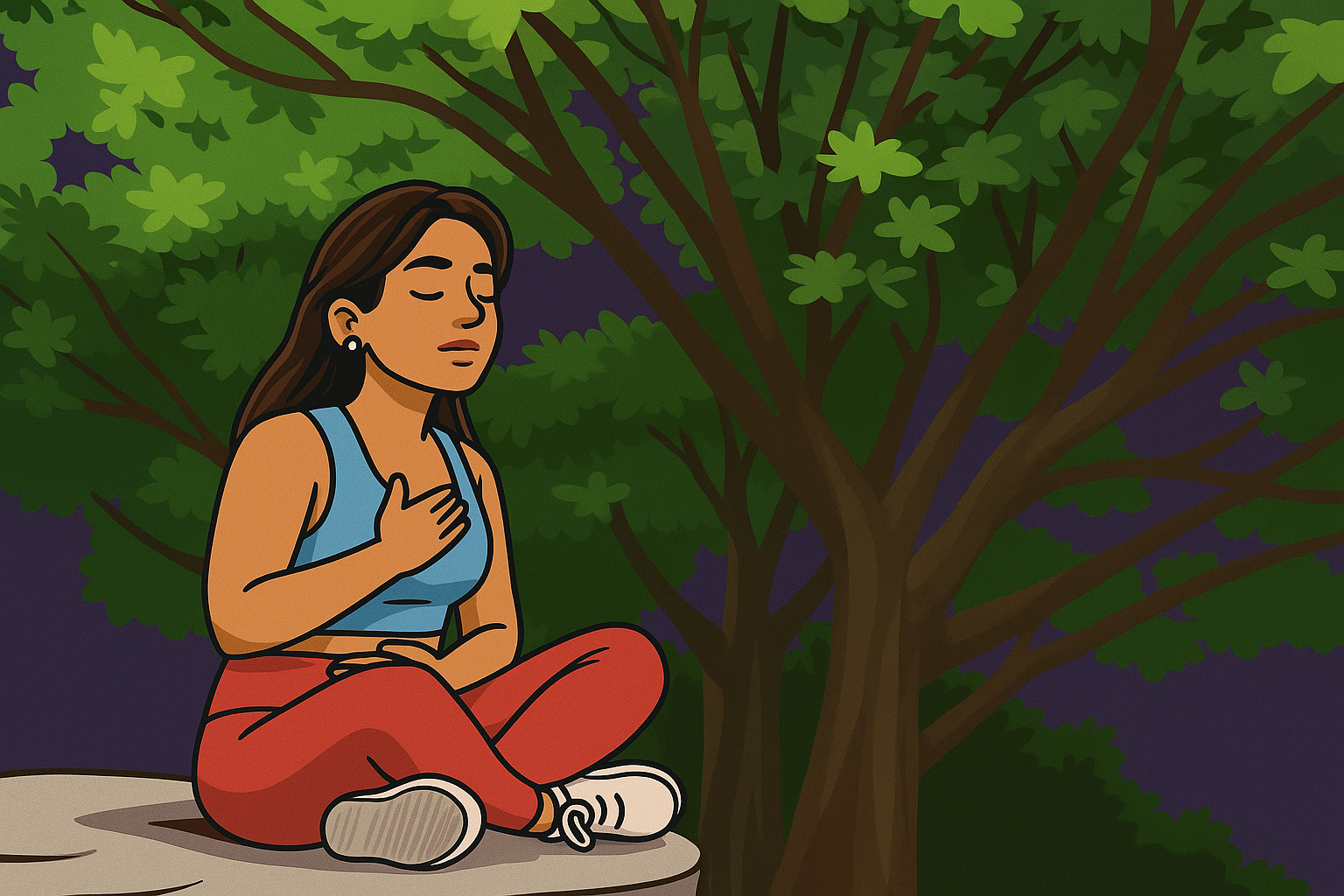For many cannabis users, acne is a frustrating and unexpected side effect. You enjoy a joint, only to wake up with a new breakout the next morning. Coincidence? Maybe not. As cannabis becomes more accepted and widely used, people are asking important questions about its impact on skin health.
This article digs into the scientific research and real-world experiences to uncover whether weed might be affecting your complexion. So if you’ve been wondering, “Can smoking weed cause acne?” — you’re about to find out everything you need to know.
Can Smoking Weed Cause Acne?
Possibly, but not directly. Smoking weed hasn’t been proven to cause acne outright, but it may contribute to breakouts through a range of indirect factors. Cannabis can influence hormone levels, sebum (oil) production, lifestyle habits, and may expose your skin to harmful smoke and toxins.
In individuals already prone to acne, cannabis use may serve as a trigger or exacerbate existing conditions. Because everyone’s skin reacts differently, it’s worth examining how weed could be affecting your overall skin health.
How Weed Affects the Body and Skin
Marijuana affects the body via the endocannabinoid system (ECS), a complex network of receptors that regulate mood, appetite, immunity, inflammation, and yes — even skin health. THC (tetrahydrocannabinol), the psychoactive component in cannabis, binds to these receptors and alters their normal function.
Some studies suggest cannabis may increase sebum production, potentially clogging pores. On the other hand, it may also reduce inflammation — a major factor in acne. This contradictory relationship makes the connection between weed and acne complex and highly individualized.
Potential Reasons Why Smoking Weed Could Lead to Acne
1. Hormonal Fluctuations
Cannabis can influence hormones, particularly testosterone, which is known to stimulate oil production in the skin. Elevated testosterone may lead to oily skin and clogged pores.
THC may also disrupt the endocrine system, leading to hormonal imbalances that can surface as acne. If your breakouts seem to correlate with cannabis use, hormone changes may be to blame.
2. Increased Sebum (Oil) Production
Sebum plays a vital role in keeping your skin hydrated, but excess oil can clog pores and feed acne-causing bacteria. Cannabis may trigger overactive sebaceous glands, especially in sensitive individuals.
Combined with poor hygiene or neglecting skincare routines while high, excess oil can quickly turn into unwanted pimples.
3. Weed-Related Lifestyle Habits
Let’s be honest: getting high often comes with munchies and lethargy. That can mean greasy food, sugary snacks, and skipping your nightly face wash. All these habits are enemies of clear skin.
Poor diet and irregular skincare increase the chances of clogged pores, skin inflammation, and acne breakouts.
4. Weed Smoke and Toxins
Any kind of smoke — whether from cigarettes or cannabis — contains toxins and free radicals. These compounds can irritate the skin, damage healthy cells, and lead to inflammation.
Prolonged exposure may contribute to early aging signs and persistent skin issues, including acne.
5. Contaminants in Weed
Not all cannabis is clean or safe. If you’re purchasing from unregulated sources, your weed might contain pesticides, mold, or chemical additives that can trigger skin irritation or allergic reactions.
To protect your skin, opt for high-quality, lab-tested cannabis whenever possible.
Is Vaping or Edibles Any Better for Acne?
Switching to edibles or vaping might reduce some skin-related issues, particularly those linked to smoke exposure. Edibles avoid combustion altogether, reducing contact with irritants that can harm your skin.
However, both edibles and vape products still introduce THC into your system, meaning hormonal effects and increased oil production are still possible. If you’re acne-prone, choose clean, high-quality ingredients and observe how your skin responds.
Does CBD Cause or Help Acne?
CBD (cannabidiol), unlike THC, doesn’t cause a high and may actually help with acne. Research shows that CBD can reduce inflammation, regulate sebum production, and even prevent the activation of acne-triggering agents in the skin.
Topical CBD products are now widely used in skincare routines, especially among those with oily or acne-prone skin. If you’re looking for a cannabis-based option with skin benefits, CBD may be the way to go.
Who Is Most at Risk of Weed-Related Acne?
Not everyone who smokes weed develops acne. However, certain individuals may be more vulnerable:
- Teens and young adults: hormonal fluctuations are already high
- People with oily or sensitive skin
- Frequent or heavy cannabis users
- Individuals with inconsistent or poor skincare routines
If you fall into any of these categories and notice recurring breakouts, cannabis could be contributing to your skin issues.
Tips to Reduce Acne if You Smoke Weed
You don’t have to give up cannabis entirely to enjoy clearer skin. These simple practices can help:
- Use high-quality, lab-tested cannabis only
- Wash your face before and after smoking
- Drink lots of water to flush toxins
- Avoid junk food when high
- Stick to non-comedogenic skincare products
- Keep your hands away from your face
- Moderate your cannabis use or switch to CBD
Consistency in these habits can greatly reduce weed-related skin flare-ups.
When to See a Dermatologist
If your acne becomes severe, painful, or persistent, consult a dermatologist. They can assess whether cannabis use is a factor and recommend targeted treatment options.
Sometimes, acne may stem from underlying conditions that require medical attention. A dermatologist can help you strike the right balance between cannabis use and maintaining clear, healthy skin.
Conclusion
So, can smoking weed cause acne? Not directly, but it can play a contributing role. From hormonal changes and excess oil to poor skincare habits and smoke exposure, there are several ways cannabis might impact your skin.
Everyone reacts differently. If you notice a pattern between your weed use and breakouts, it may be time to tweak your routine. That doesn’t always mean quitting, but it does mean being intentional about how you consume and care for your skin.
FAQs
Is smoking weed a proven cause of acne?
No, but it may indirectly contribute through hormones, oil production, and lifestyle choices.
Does quitting weed help clear skin?
It can, especially if cannabis was influencing your hormones or skincare habits.
What’s worse for acne — smoking weed or cigarettes?
Cigarettes contain more toxins, but both introduce harmful substances that can affect your skin.
Can topical CBD products help with acne?
Yes, CBD has anti-inflammatory and oil-regulating properties that may benefit acne-prone skin.
How can I protect my skin if I continue smoking weed?
Stay hydrated, maintain a clean skincare routine, use quality cannabis, and consider switching to CBD.


